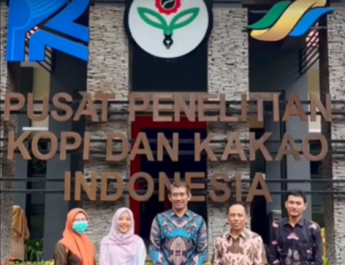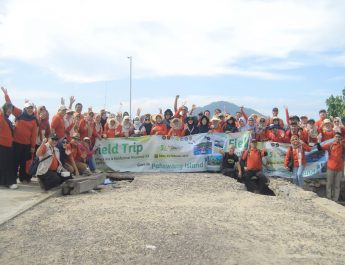
Lecturer of agribusiness department, Faculty of Agriculture, University of Lampung (agribusiness FP Unila) Dr. Novi Rosanti, S P., M E P., Mother Lina Marlina, S.P., M.Si., and Mrs. Yuliana Saleh, S.P., M.Si., filling the broadcast as a resource for the Faculty of Agriculture to work on the topic “ can Coffee agribusiness make farmers prosperous?", located at the Integrated Field Laboratory of FP Unila, Thursday (19/8/2021).
Coffee is a plantation commodity whose existence is increasingly glimpsed by the world market. This condition is in line with the increasing consumption of coffee in the world. ICO (International Coffee Organization) (2020) recorded a growth in World coffee consumption from 2016/2017 to 2019/2020 of 2.2%, with a total consumption in 2016/2017 of 158.125 million bags (1 bag = 60 kg) and an increase in 2019/2020 of 165.053 million bags.
Currently, Indonesia is ranked 4th as the largest coffee exporting country in the world after Brazil, Vietnam and Colombia (ICO, 2019). Coffee commodities in Indonesia become one of the commodities that have the opportunity to continue to be developed as a mainstay export product. Most Indonesian coffee is a type of robusta.
Generally, coffee plantations are managed by smallholder plantations. Usually the management of these smallholders Estates is still simple and the cultivation carried out is hereditary, so the application of new technologies and maintenance is less intensive. The challenge of the success of coffee agribusiness requires support from all relevant parties in the coffee production process ranging from the provision of superior seeds, cultivation, processing, marketing of coffee commodities, the role of supporting institutions and policies. The development of the coffee industry starts from an increase in production followed by an increase in coffee productivity with improvements in farmers ' production factors (increased skills and knowledge), inputs (availability of fertilizers, superior seeds), and capital (availability of capital).
Farmers as one of the factors of production that will determine the success of coffee agribusiness. Currently, the application of innovation by coffee farmers has not been widely done, especially in the management of coffee cultivation in accordance with good cultivation techniques (Good Agriculture Practice/GAP). This condition has an impact on the slow process of transferring science and technology from coffee experts, research institutions, extension workers to farmers. Diffusion of innovations for the production of coffee needs to be done, especially for the use of high-yielding varieties of seeds that are susceptible to disease, mechanization when harvesting (at harvest time) requires labor beyond the usual work done by hand. To answer the challenges need to be done intensive counseling and ongoing to change the mindset of farmers, even if necessary made a policy demonstration pilot that shows how innovation is able to improve coffee production.
According to Bravo-Monroy, Potts, and Tzanopoulos (2016), factors that encourage the adoption of good coffee management management are involvement in the organization, availability of technology, formal education, land ownership, land area, coffee productivity, production costs, profits and income obtained by farmers from coffee and income from outside coffee, and government policy.
Aspects of production inputs that include fertilizer, superior seeds and capital need to be considered to develop coffee commodities . Coffee farmers are generally experiencing problems in capital, access to fertilizer inputs and marketing issues (related to the quality of coffee beans produced, the network to find the target market). The results of research Listyati, Sudjarmoko, and Hasibuan (2013) showed that robusta coffee farmers in Lampung many who use planting material from trees that bear fruit. This causes the productivity of coffee plants to be low. Perception of farmers and the availability of seeds is one factor that can encourage farmers to adopt these superior seeds.
Farmers who have sufficient capital tend to manage coffee intensively, but farmers who lack capital tend to manage traditionally. According to Nalurita et al (2014), capital for coffee plantations is still inadequate, this is due to many factors including, land ownership that has not been certified, the lack of light anggungan credit from the government, as well as coffee production that is still dependent on nature. The provision of subsidized interest loans by financial institutions to farmers can be used to help the availability of capital for farmers to support production inputs, so that farmers ' coffee production can increase.




